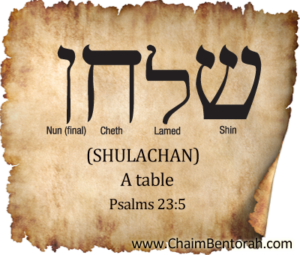Hebrew Word Study – Winter חָרַף
 The word “winter” חָרַף when spelled in reverse is פָּרַח ,a word for “blossoming“. It is a reminder that there is a purpose to every season and that at the end of its cycle, there will be flowers that blossom and fruit that yields!
The word “winter” חָרַף when spelled in reverse is פָּרַח ,a word for “blossoming“. It is a reminder that there is a purpose to every season and that at the end of its cycle, there will be flowers that blossom and fruit that yields!Would you like Chaim Bentorah as your personal Hebrew teacher?
|
|
If you would like to see more verse studies on the Song of Solomon, check out my S.O.S. course study at The All-Access Learning Channel, I’ll leave the link in the comments below.
Blessings, Laura

Here’s the link to check out the Song of Solomon Course:https://steve-s-school-acb2.thinkific.com/courses/song-of-solomon
Here’s the link to view all courses at The Learning Channel: https://www.hebrewwordstudy.com
Psalms 23:5: “Thou preparest a table before me in the presence of mine enemies: thou anointest my head with oil; my cup runneth over.”
 It seems the commentators tend to walk in lockstep with each other in their explanation of the first part of this verse. What does David mean that God prepares a table before him in the presence of his enemies? Most Christian commentators seem to agree that God is providing a great feast for David as his enemies look upon him wondering how he could enjoy such a feast when they are about to lop off his head. In other words, it is David’s way of saying that he has no fear of his enemies.
It seems the commentators tend to walk in lockstep with each other in their explanation of the first part of this verse. What does David mean that God prepares a table before him in the presence of his enemies? Most Christian commentators seem to agree that God is providing a great feast for David as his enemies look upon him wondering how he could enjoy such a feast when they are about to lop off his head. In other words, it is David’s way of saying that he has no fear of his enemies.
This is in keeping with his walking through the valley of the shadows and fearing no evil. It also keeps with the shepherding motif. The shepherd leads his sheep to lush fields to graze and watches over them protects them from any predators while the sheep eat to their hearts content totally oblivious to any dangers. So too, David is able to enjoy a great feast without fear of attack by his enemies.
My studies in Archaeology cry out: “Hold it, wait one doggone minute!” Why are we so quick to assume that the table represents a banquet or feast or even having a meal? This only says that God prepares a table. Just a table, no feast, no banquet, simply a table. The word table in Hebrew is shulachan which comes from the root word shalach which is a word used for moving toward a goal or resolution. So, what does that have to do with a table? Another word in Hebrew for table is tavala which is a board or plank of wood. That is what comes to my mind when I hear the word table. Shulachan is a different, special table. A table of reaching a goal or resolution to a problem.
Hi there! Thank you for reading this Daily Word Study. Can I ask a favor? Share this Daily Word Study with your friends on Facebook and Twitter by clicking one of the icons below.
Thanks & Blessings, it means a lot to me!







The thoughts shared about the word “winter” are so beautiful. I especially like that in reverse it spells a word for blossoming. How perfect is that! The line “Just as we can not get the oil of intimacy with Jesus from another…” is something I wish I could’ve heard as a child because I always thought those five girls who wouldn’t share their oil were selfish and I was disappointed that the Bible seemed to condone their behavior. What a relief when as an adult my Bible study time led to a better understanding. Laura, your words are a lovely explanation and inspirational towards seeking that intimacy.
Thank you so much for sharing that. Blessings, Laura
I really enjoyed the Winter ministry. I have read your Books on Learning God’s Love Language, Hebrew Word Study:Revealing the Heart of God and others. I have been so enlightened in how you passionately share the knowledge you have gained through your studies and relationship with God.
I’m glad you enjoyed the “winter” study that I wrote and Chaim’s books! Blessings, Laura
THANKYOU Chaim…. : ) Perfect timing for me to read this about Psalm 23 and your article on Winter.We’re at the beginning of Autumn ,here in New Zealand.And the World is going thru another war along with Covid 19 as i tap these words to submit my comment.Jesus Trully is THE Prince Of Peace and Savior to All who call on Him,Trust Him and surrender their Lives to Him.It is not so easy to continue,on a Daily,Monthly or Yearly walk to trust Him,Surrender to Him and Obey Him…But it iS possible for Him to break us so that we Can.
Hello Hamish
It was actually me, Laura who wrote this, and we didn’t know New Zealand was going through this again. We’re praying and it is comforting to know that ultimately our lives are in God’s hands. Blessings< Laura